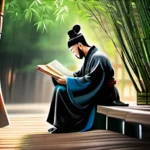Explore the philosophy, ethics, and social structure of Confucianism in this detailed guide.
Confucianism is an ancient Chinese philosophy that has greatly influenced East Asian societies for thousands of years. In this article, we will delve into the core principles, ethical teachings, and social structure of Confucianism.
The Foundations of Confucianism
Confucianism, like a river flowing through the ages, has shaped and molded the cultures of East Asia for centuries. But where did it all begin? Who was Confucius?, you might wonder, and what set him apart from his contemporaries? Confucius, whose given name was Kong Qiu but is widely known as Confucius, lived during the Eastern Zhou Dynasty (770-256 BCE). He saw a world in turmoil, with social upheaval and political instability. Can you imagine living in such times, where the very fabric of society seemed to be unraveling before your eyes? This is the backdrop against which Confucianism was born.
Confucius sought to restore order and harmony by emphasizing virtue and propriety. He believed that leaders should lead by example and that education could transform individuals, communities, and even nations. The Analects, a collection of sayings attributed to Confucius, became the foundational text for his teachings. These texts are like ancient scrolls, each one holding profound wisdom waiting to be deciphered.
The core principles of Confucianism can be seen as the DNA that guides its philosophy and ethics: Ren (仁), meaning humaneness or benevolence; Zhi (智), which translates to knowledge or wisdom; Li (礼), referring to propriety or ritual; Xiao (孝), meaning filial piety, and Yi (义), standing for righteousness. These principles are not just abstract ideas but a practical guide for living life in harmony with others and the universe.
Understanding these foundational elements is crucial because they form the bedrock upon which Confucian ethics and social structure are built. They are like the pillars of a grand hall, each one supporting the weight of tradition and societal expectations. In the next chapter, we will delve into how these principles manifest in the five relationships that define Confucian ethics.
Confucian Ethics: The Five Relationships
Imagine a world where every interaction, whether it’s a conversation at home, a meeting at work, or even passing by a stranger on the street, has a purpose and a set of guidelines. That’s what Confucian ethics aims to achieve through its framework known as the five relationships. These relationships are not just social constructs but deep-seated principles that guide behavior and ensure harmony in society.
The five relationships are: ruler to subject, father to son, husband to wife, elder brother to younger brother, and friend to friend. Each relationship carries specific duties and responsibilities. For example, a ruler must be just and humane, while a subject must show loyalty and respect. In the familial relationship, a father is expected to be nurturing and wise, whereas a son must display filial piety and obedience.
These relationships are like the threads of a tapestry; they weave together to form a cohesive society. If one thread is weak or missing, the whole fabric loses its strength. Confucian ethics sees these relationships as the building blocks of not just families but of the state and even international relations. They provide a structure for every individual to act with propriety—the right way to behave in any given situation.
The importance of these relationships cannot be overstated. In times of social unrest, they offer a moral compass that can steer society back towards order and harmony. Think of them as the silent teachers that guide behavior without explicit rules or laws. They are the essence of Ren, which can be loosely translated as humaneness or benevolence—qualities that Confucian ethics deems essential for a virtuous life.
The five relationships are not static; they evolve over time and adapt to changing societal needs, just like the fabric of a tapestry gets patched and mended. But their fundamental principles remain constant, ensuring that no matter how much the world changes, the core values of Confucian ethics continue to guide individuals and communities towards a more harmonious existence.
The Analects: Key Teachings of Confucius
The Analects, a collection of sayings and ideas attributed to Confucius, provide us with a window into the essence of his philosophy. Imagine these texts as a map; they guide us through the vast landscape of Confucian thought, offering insights that have shaped not only Chinese society but also influenced the world at large.
One of the most famous sayings in The Analects is ‘To subdue one’s self and return to propriety is benevolence.’ This phrase, when pondered deeply, challenges us to consider our own behaviors and motivations. Just as a tree stands tall by its roots, so too must an individual stand strong through the cultivation of virtues like righteousness and kindness.
In The Analects, Confucius often emphasizes the importance of filial piety. This is more than just obeying one’s parents; it’s about honoring them, learning from their wisdom, and carrying forward their values. Isn’t it a powerful idea that our actions can be a continuation of those who came before us, ensuring their legacies live on?
Another key concept in The Analects is ‘Do not impose on others what you yourself do not desire.’ This golden rule encourages us to treat others as we would like to be treated. It’s like walking a tightrope; maintaining this balance can be challenging, but it fosters mutual respect and understanding.
The Analects also highlight the significance of education. Confucius believed that true wisdom comes from self-cultivation through learning. This is akin to watering a garden; the more we nurture our minds with knowledge, the richer and fuller our lives become. Education not only enhances individual character but also contributes to societal well-being.
Through these teachings, The Analects offer us a framework for leading a virtuous life. By embodying these principles—benevolence, filial piety, respect, and education—we can strive to create a harmonious society where each person’s actions contribute positively to the whole. The journey to becoming a wise and benevolent individual, much like scaling a mountain, is continuous and rewarding.
Confucian Social Structure: The Five Bonds
Imagine a social structure that resembles a intricate web, where each strand represents a key relationship. In Confucianism, this network is defined by five core bonds known as renqing, or human feeling. These relationships are not just personal connections but are central to maintaining harmony in society.
The first bond, Zhong Zi, meaning loyalty and filial piety, ties a son to his father. It’s like the sturdy roots of a tree holding it firmly in place; without these roots, the tree would wither. This relationship isn’t just about obedience but also about respecting and honoring one’s parents.
The second bond, Husband-Wife, highlights mutual respect between partners. Think of a chess game where each piece has its own role yet works in tandem; if one moves out of line, the whole board is disrupted. This relationship emphasizes harmony through understanding and respect for each other’s roles.
The third bond, Friendship, involves trust and righteousness between friends. It’s akin to a dance where every step must be timed perfectly to avoid collisions. Friends should support and guide each other with sincerity and integrity.
The fourth bond, Superior-Subordinate, is about the hierarchical relationships like those in government or businesses. This relationship is like the flow of water—it naturally follows the path of least resistance but must be channeled properly to ensure smooth operation without obstruction or stagnation.
Lastly, the fifth bond, Ruler-Subject, involves loyalty from subjects towards their rulers and respect from rulers for their people. This relationship is like a balance beam where the ruler needs to walk carefully, ensuring stability and justice for all while guiding the state with wisdom and care.
Together, these bonds create a framework that not only guides behavior but also fosters mutual respect and cooperation in society. By understanding and adhering to these relationships, individuals can contribute positively to their community, much like pieces of a puzzle coming together to form a complete picture.
Can you see how these five bonds weave through the fabric of social life, ensuring that every individual knows their place and responsibilities? It’s not just about rules but about creating a society where everyone is connected and supportive, forming a harmonious whole.
The Influence of Confucianism on Chinese Culture
How does Confucianism shape every aspect of Chinese culture, values, and traditions? To truly understand this, we must delve into its profound influence that has spanned thousands of years. Imagine a river, slowly but steadily carving through the landscape, shaping it over time. In much the same way, Confucianism has shaped Chinese society, creating a rich tapestry of values and practices that continue to influence daily life.
One cannot discuss Confucianism without touching upon its central role in education. From early childhood, children are taught the virtues of respect, filial piety, and benevolence. These teachings permeate every level of society, from schools to workplaces. ‘Is it not a joy to have friends come from afar?’ asks Confucius, emphasizing the importance of social connections in life. This attitude is reflected in Chinese communities where relationships are highly valued.
The influence extends beyond personal conduct into governance and ethics. The concept of ‘zhèng qíng’ (正名), or proper names, ensures that people fulfill their roles correctly within the societal hierarchy. This idea has been integral to how power is structured in China, from ancient dynasties to modern governments.
Moreover, Confucianism’s emphasis on ‘xìn’ (信), or trust, and ‘zhèng yì’ (正义), righteousness, has fostered a culture of integrity. These values are embodied in the practice of honesty and fair dealing, whether in business transactions or personal interactions. Can you imagine a society where such principles are not only taught but lived by everyone?
Even in modern times, these teachings continue to shape societal norms. From family gatherings that emphasize respect for elders to professional settings where seniority is respected, Confucian values remain deeply ingrained. As China faces the challenges of rapid economic growth and technological advancement, its traditional cultural roots offer a balanced approach to development.
So, as we explore how Confucianism has shaped Chinese culture, remember that it’s not just about historical traditions but a living, breathing influence that continues to define what it means to be Chinese in the 21st century. How can such enduring values fail to shape our understanding of ourselves and society?
Confucianism Today: Modern Interpretations and Practices
How does Confucianism play out in today’s world? It’s not just a relic from ancient China; it’s woven into the fabric of modern East Asian societies, influencing everything from education to politics and social interactions.
Imagine a bustling metropolis like Seoul or Tokyo, where streets buzz with activity. Behind this hustle is a deep-seated respect for order and hierarchy, principles that trace their roots back to Confucian teachings. In these cities, one can see how filial piety (the respect for elders) and benevolence still guide behavior in professional and personal settings.
Consider the role of education in these societies. Schools often incorporate Confucian values like integrity and diligence into their curricula, preparing students not just to succeed academically but also morally. This is akin to planting seeds that will bloom into responsible citizens who uphold traditional virtues.
In politics too, one can observe a subtle yet profound influence of Confucianism. Leaders often espouse values like ren (benevolence) and de (virtue), drawing on these concepts to justify their policies and actions. It’s as if the leaders are using ancient wisdom to navigate contemporary challenges, trying to create a harmonious society.
Moreover, social interactions in East Asian communities reflect Confucian ideals of respect and propriety. Whether it’s a business meeting or a family gathering, manners and etiquette play crucial roles. These practices ensure that everyone knows their place and responsibilities, maintaining the delicate balance of relationships.
So, how do these modern interpretations and practices of Confucianism shape our understanding of this philosophy? It’s clear that even in a rapidly changing world, Confucian ethics continue to provide a moral compass for millions. They serve as a reminder that despite the passage of time, certain values remain timeless and essential.
Conclusion
 By understanding the fundamental concepts of Confucianism, you will gain a deeper appreciation for its impact on Chinese culture and society. This knowledge can also provide valuable insights into contemporary East Asian values and practices.
By understanding the fundamental concepts of Confucianism, you will gain a deeper appreciation for its impact on Chinese culture and society. This knowledge can also provide valuable insights into contemporary East Asian values and practices.











